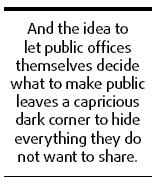A tantalizing blossom
When the first requests for government institutions to share information ran into a stonewall amid the initial excitement over the Regulations on Government Information Disclosure, people found to their disappointment that the path-breaking document was simply too ambiguous to deliver what it promised. So expectations were high for the Supreme People's Court (SPC) to come up with judicial interpretations to add teeth to the regulations.
The current version of the anticipated SPC interpretations has, however, turned out to be yet another damp squib. All the crucial gray areas that allow government agencies unbridled latitude to dodge disclosure obligations remain. Instead of specifying government responsibilities, it corroborates the popular impression that public offices can continue to conceal secrets in spite of the well-touted goal to build a "government in the sunshine".
The first round of civic endeavors to challenge the authorities' obsession with secrecy ended in miscarriage mostly because public offices were given unlimited authority to determine what information should be open to the public. So even if a court were willing to hear such a case, there is little chance of a verdict in favor of the plaintiff. Not only that the courts are by and large reluctant to challenge government offices, but also that the latter can easily find a way out with the help of the inherent ambiguity in the document.

We see no change in that regard. Article 11 of the SPC interpretations allows government offices to withhold information in six categories. The third, "the publication of which may endanger State, public and economic security and social stability", and the fourth, "that is certified as not suitable for publication by relevant authorities, or same-level security agencies in accordance with law," are obviously the most problematic.
Officials can label everything they do not want to share as a threat to security or stability. Take, for example, the reply a Beijing resident got to his request for the audit departments to publish information about illicit use of revenues from land transfers. The request was turned down, on the ground that the information he had demanded "involves a high degree of concern in society and is highly sensitive, and the publication may result in undesirable impacts on social security". And the idea to let public offices themselves decide what to make public leaves a capricious dark corner to hide everything they do not want to share.
Equally, if not more, ridiculous is the clause that the courts can refuse litigation where the plaintiff cannot reasonably explain that the information requested is necessary for his, her, or their "productive activities, living, or scientific research". This is an outright infringement of citizens' right to know. Why should citizens be denied access if the motivation is public good? Let the regulations not be reduced to a tantalizing blossom that never bears fruit.
(China Daily 12/03/2009 page8)














